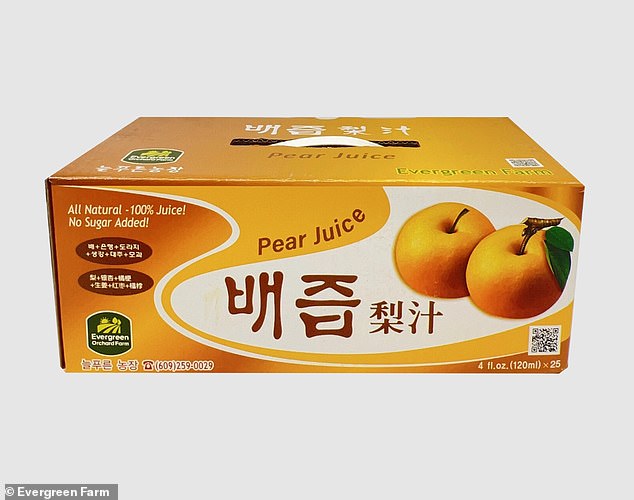[ad_1]
More than 22,000 fruit juice containers have been recalled over fears they could be contaminated with a potentially dangerous bacteria.
New Jersey-based Evergreen Orchard Farm issued the alert for its Korean Pear, Grape and Jujube juices after FDA investigators found no record that they had been pasteurized.
Most juices in the US are pasteurized, or rapidly heated and cooled, before being sold to customers to kill any potentially harmful bacteria such as salmonella or E.coli.
These bacteria can cause nausea, vomiting and diarrhea, and are particularly dangerous for young children and older adults who have weaker immune systems.
The juices were sold in retail stores in New Jersey, New York and Pennsylvania, the alert said, and at the farm itself, which is based in New Jersey.
The FDA said this was a Class II recall, the second-highest category which is used when the probability of ‘serious adverse health consequences is remote’.
No sicknesses have been reported due to the juices to date.

Pictured above is a case of Korean pear juice, one of the juices that is in the recall
The FDA issued the recall in early July, but published an update on Wednesday stating the recall was now a Class II.
The juices were sold in foil pouches holding four ounces of fluid each, with 25 of these pouches packaged in every case.
The recall was for 15,250 pouches of Korean pear juice, with affected products bearing the codes P20261110 and P20261130.
It also included 4,925 pouches of Jujube juice, which have the codes J20260910 and J20261110, and 1,950 pouches of grape juice, with codes G20261215.
The FDA does not require juices sold at farms to be pasteurized, but says that if they are not pasteurized, then the juices should be refrigerated and carry a warning label stating they may contain potentially harmful bacteria.
It appears that in this case, FDA investigators were told the juices were pasteurized but found that the farm could not prove it using their own records.
This means it is unclear whether the juices were pasteurized and record of the process was lost, or they had not been pasteurized at all.
Fruits may become contaminated with harmful bacteria via irrigation if the water used is contaminated with animal feces.

Shown above are the three juices in the recall on sale at the farm in 2022

There was no record that the juice was pasteurized, suggesting they could be contaminated with a dangerous bacteria (stock photo)
During pressing, the harmful bacteria can then be mixed into the juice, meaning major manufacturers need to use treatment to remove it.
Most manufacturers in the US started to pasteurize juice in the 1990s after an E.coli outbreak from unpasteurized apple juice sickened 70 people and killed a 16-month-old girl.
Of the patients, 25 were hospitalized and another 14 developed hemolytic uremic syndrome, a serious condition that leaves the kidneys less able to filter the blood.
Many other countries pasteurize their fruit juices, including the UK, Sweden and France. Australia does not have a mandatory requirement to pasteurize all fruit juices.
Pasteurization is also used for milk in many countries, including the US, where it eliminates dangerous bacteria and viruses such as bird flu, amid concern that the disease could spread into humans.
Salmonella infections can trigger symptoms within six hours to six days after someone becomes infected.
Warning signs include diarrhea, stomach cramps, fever, nausea, vomiting and, in some cases, blood in the stool.
For healthy people, the infection will generally last to a few days for a week before symptoms ease.
But in severe cases, the bacteria may spread from the intestines to other parts of the body and cause sepsis.
The Mayo Clinic says someone should book to see a doctor if the infection does not clear up in a few days and it is causing them to become dehydrated, with signs such as urinating less or dark-colored urine.
People tend to catch salmonella by consuming raw or undercooked seafood, red meat, poultry or unpasteurized milk or fluids.
About 1.35million people are infected with salmonella in the US every year and 420 die from the disease.
E.coli numbers vary greatly as it is often undiagnosed, but the CDC estimates there are about 95,000 cases and at least 30 deaths annually.
[ad_2]
This article was originally published by a www.dailymail.co.uk . Read the Original article here. .

